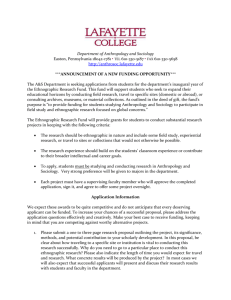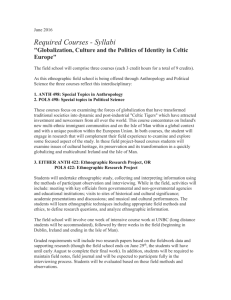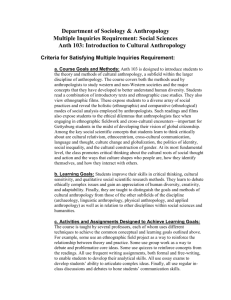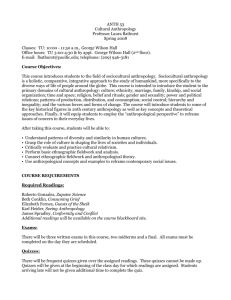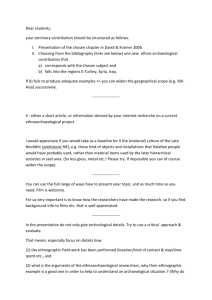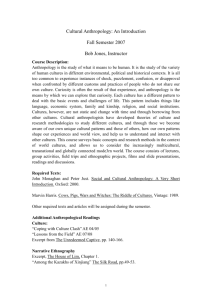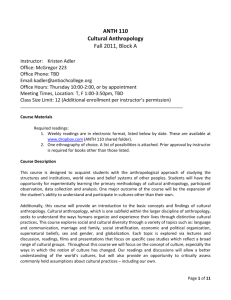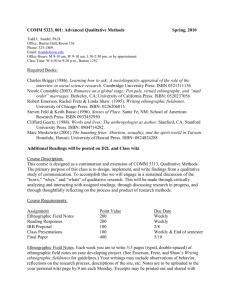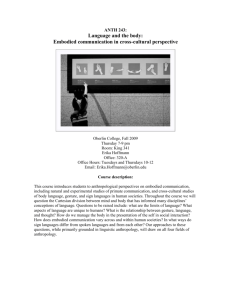Universita di Sceinze Gastronomiche
advertisement
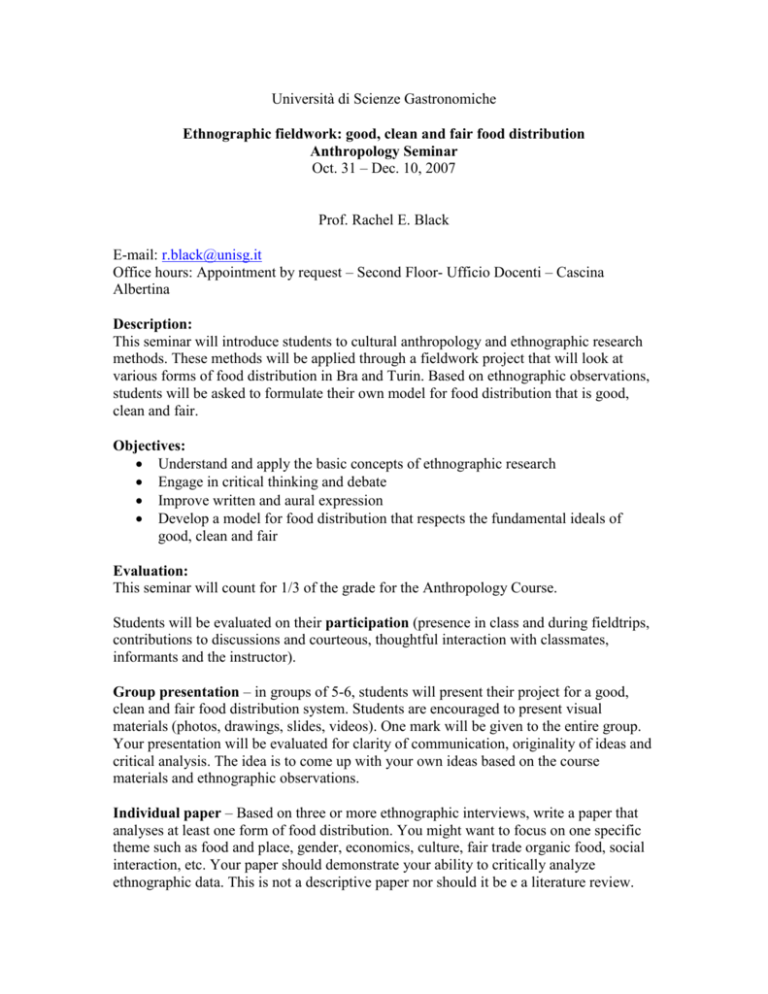
Università di Scienze Gastronomiche Ethnographic fieldwork: good, clean and fair food distribution Anthropology Seminar Oct. 31 – Dec. 10, 2007 Prof. Rachel E. Black E-mail: r.black@unisg.it Office hours: Appointment by request – Second Floor- Ufficio Docenti – Cascina Albertina Description: This seminar will introduce students to cultural anthropology and ethnographic research methods. These methods will be applied through a fieldwork project that will look at various forms of food distribution in Bra and Turin. Based on ethnographic observations, students will be asked to formulate their own model for food distribution that is good, clean and fair. Objectives: Understand and apply the basic concepts of ethnographic research Engage in critical thinking and debate Improve written and aural expression Develop a model for food distribution that respects the fundamental ideals of good, clean and fair Evaluation: This seminar will count for 1/3 of the grade for the Anthropology Course. Students will be evaluated on their participation (presence in class and during fieldtrips, contributions to discussions and courteous, thoughtful interaction with classmates, informants and the instructor). Group presentation – in groups of 5-6, students will present their project for a good, clean and fair food distribution system. Students are encouraged to present visual materials (photos, drawings, slides, videos). One mark will be given to the entire group. Your presentation will be evaluated for clarity of communication, originality of ideas and critical analysis. The idea is to come up with your own ideas based on the course materials and ethnographic observations. Individual paper – Based on three or more ethnographic interviews, write a paper that analyses at least one form of food distribution. You might want to focus on one specific theme such as food and place, gender, economics, culture, fair trade organic food, social interaction, etc. Your paper should demonstrate your ability to critically analyze ethnographic data. This is not a descriptive paper nor should it be e a literature review. Paper must be 1500-2000 words, typed and double-spaced. No electronic submissions or late papers accepted. Plagiarized papers will receive a mark of 0. Due Dec. 10 in class. Participation 25% Group presentation 35% Individual paper 40% Course Readings: All readings are available at www.rachelblack.ca (under courses) password: gusto Readings are indicated for each day and should be completed before class. Please bring your questions and comments. We will be working closely with the course material and it is essential that you read carefully and critically. Course outline and readings: Oct. 31 – 9:30-11:00 Course objectives Introduction to cultural anthropology Ethnographic research methods Readings: Sutton, David. “The Vegetarian Anthropologist” Anthropology Today, Vol 13(1) Feb. 1997: 5-8. Monaghan, John & Peter Just. “Bee larvae and onion soup: Culture” in Social & cultural anthropology: A very short introduction. Oxford: Oxford University Press, 2000: 34-52 Nov. 5 - 16-17:30 Good, clean and fair – what does this mean? How can we apply these ideas? Food distribution in Europe and North America – a comparative overview Readings: Leitch, Alison. “Slow Food and the politics of pork fat: Italian food and European identity” Ethnos vol. 68(4), Dec., 2003: 437-462. 2 Nov. 14 – 13:30-18:30 Fieldtrip to Eataly Bus will leave from Pollenzo after lunch Visit will include time to shop, browse and eat. Presentation of Eataly Also visit the PAM supermarket across the street to compare these two provisioning options Readings: Ashley, Bob et. al. “Shopping for food” in Food and cultural studies. London: Routledge, 2004: 105-122 Wilkinson, John. “The Embedding of markets and networks in global social movements” Gastronomic Sciences. Vol. 1, 2007: 46-55. (disponibile in italiano) Nov. 23 – 9:30-12:45 Fieldtrip to the mercato di Bra Meet on the steps of the Palazzo Comunale at 9:30 9:30-10 - Short talk by the city’s market manager and director of commerce – Sigra. Ternavasio Visit the market individually or in small groups Meeting and discussion in the covered farmers’ market area in English – 11:00, Italian – 11:45 Readings: Black, Rachel “Porta Palazzo Farmers’ market: Local food, regulations and changing traditions” Anthropology of Food December 2004. Feenstra, Gail “The role of farmers’ markets in fueling local economies” Gastronomic Sciences. Vol. 1, 2007: 56-64. (disponibile in italiano) Frassanito, Pierluigi “The mercati contadini of Italy” Gastronomic Sciences. Vol. 1, 2007: 65-67. (disponibile in italiano) Dec. 10 – 14-17:30 Reflections on the use of ethnographic methods and the possible application of the values of good, clean and fair to food distribution. Group Presentations ***Final paper due in class*** Additional references: Appadurai, Arjun. Modernity at Large: Cultural Dimensions of Globalization. University of Minnesota Press, 1996. 3 Cavanaugh, Jillian R. “Making Salami, Producing Bergamo: The transformation of value” Ethnos 72(2), 2007: 149-172. Counihan, Carole. Around the Tuscan Table: Food, Family and Gender in Twentieth Century Florence. New York: Routledge. Crewe, L. &. Gregson, N. “Tales of the unexpected: Exploring car boot sales as marginal spaces of contemporary consumption” Transaction of the Institute of British Georgraphy, 23(1) 1998, 39-53. de la Pradelle, M. “Market exchange and the social construction of public space” French Cultural Studies, 6, 1995: 359-371. Geertz, C. “The Bazaar economy: Information and search in peasant marketing” American Economic Review, 68(2) 1978, 28-32. Henochsberg, M. La place du marché. Paris: Denoel, 2001 Humphrey, K. Shelf life: Supermarkets and the changing cultures of consumption. Cambridge: Cambridge University Press, 1998. Low, S. M. On the plaza: The politics of public space and culture. Austin : University of Texas Press, 2000. Miller, D. The dialectics of shopping (The Lewis Henry Morgan lectures ; No. 1998). Chicago: University of Chicago Press, 2001 Peraldi, M., Foughali, N. & Spinouza, N. “Les marches des pauvres: espace commercial et espace public” Revue Europeenne Des Migration Internationales, 11, 1995: 7797. Petrini, Carlo. Slow Food Nation: Why our food should be good, clean and fair. New York: Rizzoli Ex Libris, 2007 Remotti, Francesco. Prima lezione di antropologia. Roma: Editori Laterza, 2005. Teti, Vito. Il colore del cibo: geografia, mito e realtà dell’alimentazione mediterranea. Meltrini, 1999. 4


